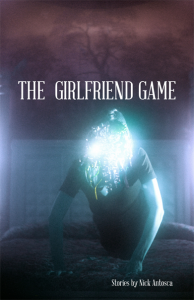 The Girlfriend Game
The Girlfriend Game
by Nick Antosca
Word Riot Press, June 2013
174 pages / $15.95 Buy from Word Riot or Amazon
“Every time we play the game, it brings us a little closer together.” So declares the title story of Nick Antosca’s poignant and feral new collection.
It’s not incidental that the book takes its title from this story. Grittier and less gothically stylized than Midnight Picnic (though quasi-supernatural dogs are no less present), the twelve stories collected here are about human closeness – the lack of it, the search for it, and the fear of it when it comes. They open with the premise of men and women drawing one another in, and play out the game that follows until some grim resolution brings that round to an end, sometimes sparing the players and sometimes not.
There are ample rat beasts, humanoid amphibians, alien landings, and panic-inducing weather patterns crowding the sky, but what’s scariest here are the ways in which, as a professor forlornly sleeping with her student puts it, “there was no escaping it, the violent strangeness of people.” Unlike in more common horror writing, where the monstrous crawls in unbidden from the basement or from another dimension, the people in Antosca’s stories call it up in one another, and access it via others in themselves.
In many of these stories, which tend to center on depressive twentysomethings in nondescript Brooklyn-based situations, people pursue one other across spiritual and geographical distances, often out of the city and into the woods. The woods, as in Midnight Picnic, are at once a sanctum of simplicity and innocence, and an arena for unleashing extreme and unpunished violence. Their sparseness of population seems to offer relief from the city’s human weight, but, as a setting for a certain kind of showdown, they serve an opposite purpose: they draw the pursuer and the pursued closer together by purging all witnesses and middlemen.
Weirdly, the violence this enables becomes a form of innocence. Beneath all the Facebook and iPhone surface noise, The Girlfriend Game fleshes out a primitive vision of society where dismemberment with knives and meathooks is a valid and even productive mode of interaction. It’s maybe the only way to play the game without tricking the other person. As one woods-bound narrator puts it, “I began to understand that only one thing might bring me peace – not fantasies of murder, but murder. I started planning.”
There are no misfires, but my four favorite stories are “Mammals,” the most purely horrific, “Winter Was Hard,” the baddest-ass, “Migrations,” the saddest and most enigmatic, and “Carnal Quartet,” which nails the vibe of darkening post-coital rooms where a hint of dread – maybe just passing time, maybe something demonic and amiss – creeps in to divide the dozing lovers, while at the same time enveloping them both.
Sex’s heightened state of aliveness lapses here into a heightened awareness, almost a premonition, of death. It’s a lovely, melancholy feeling, but Antosca doesn’t let us swoon over it. He conjures it, then cuts it down and moves on, into yet-darker territory.
The clarity and sharpness of his writing – sometimes ruminative and poetic, but stone cold sober when it needs to be – keeps the stories moving, like actual events accelerating out of control. They open with people stuck in decades-old familial and romantic ruts, but, when things start happening, they happen fast. One kind of inertia becomes another.
This compression pulls diffuse feelings and occurrences into a dense knot, creating an atmosphere of charged claustrophobia. The world hovers so tightly around the characters in these stories that, in the “cold true moment” when the weapons come out, there’s nowhere to hide nor even any chance to run.
Estranged from her boyfriend, a girl who looks younger than she is works as “Predator Bait” for an entrapment TV show. Though at first she’s pretty adept at handling the men who come to visit, her belief that predation can be kept at a distance is badly mistaken. From her earliest glimmer of panic, where a man “was coming toward her too quickly – it felt like a nightmare,” to the very last moment in which she tries to express her disgust with “every single person, without any exceptions really, including me, who’s involved in this,” she is made to witness the speed and power with which loneliness turns to repulsion. As if they were contiguous states, a dangerous excess of personal space becomes a dangerous lack.
The final story, “The Thickness of Clown Blood,” embroils its victims in “a bewildering, incomprehensible game that could drag on indefinitely.” The Girlfriend Game closes on this note. It may not be the exact same game that it opened with, but it’s an expression of the same forces, binding people tightly together into a configuration they both crave and abhor, and from which there can be only one means of lasting escape.
***
David Rice is a writer and animator from Northampton, MA. He has recent stories in Black Clock, Identity Theory, and Spork, and is currently working on his first novel. He’s online at www.raviddice.com and can be reached at raviddice@gmail.com.
Tags: David Rice, nick antosca, the girlfriend game

what kind of car does nick drive, i wonder
I bet you’d guess wrong.
subaru legacy wagon
Haha.
A Hyundai
I don’t think I’ve ever seen one of those in person. But nope.
tinyurl.com/lr69xbu